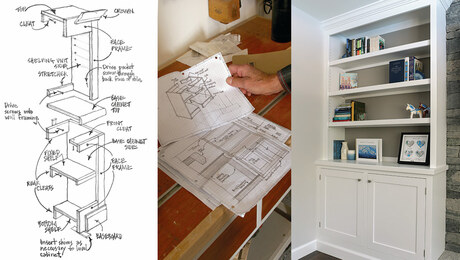*
The baseboard heat in my parents house makes a sound like the pipe is not full. It kind on “gurgles”. I started hearing this last winter, again this week. The boiler looks like there is a three way inlet valve for new water. Should I open this valve to let in water. Can it be done with the system running? Will this get rid of air in the system. Shouldn’t there be some type of valve to vent any air in the system?
Thanks in advance.
Geoffrey W.
Discussion Forum
Discussion Forum
Up Next
Video Shorts
Featured Story

A standardized approach, quick-to-install hardware, and a simplified design make building custom casework cost-effective.
Featured Video
SawStop's Portable Tablesaw is Bigger and Better Than BeforeHighlights
"I have learned so much thanks to the searchable articles on the FHB website. I can confidently say that I expect to be a life-long subscriber." - M.K.














Replies
*
Geoffrey -
You are about to embark on a very long and twisted road through the world of hydronic heating.
Once you have all the basics covered it's not rocket science.
First thing is to determine what type of components you have - steel tank or bladder tank ? air separator with automatic vent ?
And there are some other things to consider before you attempt to top off the system with additional water.
I recommend:
http://www.heatinghelp.com/
http://fhs.ittind.com/askred/askred.htm
Dan Holohan's books are good reading, available at heatinghelp.com.
There are more qualified folks among this group who can better answer your question.
Hope the above links helps in the meantime.
*Geoffrey: Yes, 'twad be nice if there were air bleed valve at all high points in the loop. But as the song says, "You don't always get what you want. . . " Adding more water will just increase the pessure in the system, it won't eliminate the air. To eliminate the air without modifying the system, you need to purge the air with a high flow of water (higher than the circulator pump does, clearly). I installed about 80 solar domestic hot water systems and we'd purge the loop with a 1-hp pump which pulled from the bottom of a bucket. The air/liquid dumped into the top of the bucket until it ran clear (no air). We had to do that because we were charging the system with glycol. The easier approach (how I charged my own house) is blast it with city water, dumping it down the drain or to a trash can. This takes an understanding of the system so you can direct the water down each loop and back out to some fitting. It may also require hot-wiring the electric valves (or setting all your thermostats so they want heat). If there are any components with a pressure limit, you'll have to watch the pressure gauge and not put so much water in as to exceed anything's limit.Purging with city water like that usually works to clear up the gurgles. It may never have been done in the first place. Or there may be a slow leak somewhere. It's nice to have a least one point in the system that rises to a vent (automatic or manual) so that the occasional air bubble traveling around the loop can find its way out. -David
*I just fixed my gurgling system by merely cleaning out the screen in my check valve--plugged shut from well water debris not letting make-up water in because i didn't think to clean it when i replaced the well pump in summertime! I have a scoop and vent on the manifold to take out the bubbles, though, so i didn't have to bleed each zone. The inlet valve stays open.
*
The baseboard heat in my parents house makes a sound like the pipe is not full. It kind on "gurgles". I started hearing this last winter, again this week. The boiler looks like there is a three way inlet valve for new water. Should I open this valve to let in water. Can it be done with the system running? Will this get rid of air in the system. Shouldn't there be some type of valve to vent any air in the system?
Thanks in advance.
Geoffrey W.